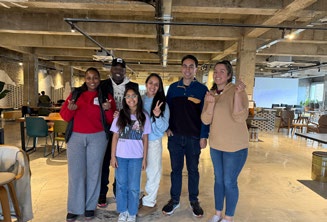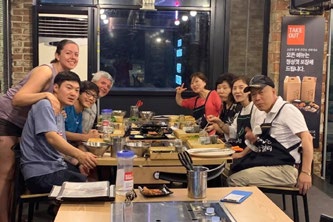The Power of Learning a New Language
- Bianca Del Carmen

- May 30
- 4 min read

In the middle of a busy life—especially for military families adjusting to new environments, pursuing a personal goal like learning a language can feel overwhelming. But in my experience, it’s one of the most eye-opening and meaningful things you can do.
Why Students Choose to Learn Korean
As a Korean language teacher living in South Korea, I work with students from all walks of life, many of whom are part of the military community. Some come to class wanting to connect with local culture and learn how to be respectful while living here. Others, like my own mother, want to speak Korean to their grandchildren. Some simply fall in love with the language and want to understand the heart behind their favorite songs or shows.
But no matter their starting point, they all discover something similar: Korean is a deeply nuanced language, full of emotion and meaning. Some words and expressions in Korean don’t have exact English equivalents. Through learning, they’re not just memorizing grammar—they’re gaining insight into a rich history and a beautiful culture.
Overcoming Discouragement and Finding Growth When Learning a New Language
There have been many times when I’ve seen my students feel discouraged when they weren’t seeing progress. We’ve all been there. Then we take a step back and realize that every time they leave class and hear something out in the Korean community—at a store, on the street, or in a conversation—they understand just a little bit more. That’s growth. On days when the progress feels slow, we pivot. We make new game plans, whether that means studying Korean music or sending voice notes to find and work on figuring out our knowledge gaps. I’m so proud of all my students, and I can’t wait to see them reach a new understanding of the language.
How Language Learning Builds Empathy and Perspective
Coming to Korea—and at first not being able to understand the language at all—made me more aware of language in general. Not just how I learn languages but how I explain myself in English, too. It made me more empathetic, more open, and more curious. It gave me a deeper understanding of why people do things differently and helped me see many new things about the world. Even when things don’t always make sense from an American perspective, being here has reminded me that there’s always another lens through which you can view a situation.
Facing the Challenges of Korean Grammar
One thing is for sure: Korean grammar can be intimidating. It’s complex, and at times, it feels like it makes perfect sense—and at other times, nothing makes sense. With that said, it is easy to get discouraged. But that’s also what makes language learning so powerful. It teaches you that setbacks aren’t failures but part of the process. When you work through the challenges of learning a language, you grow stronger in your understanding of the entire culture.
Breaking Down Patterns and Unlocking Logic
Sometimes people focus mostly on vocabulary and grammar, and yes—those are important. It is good to remember that language learning is also about breaking things down into patterns and making sense of the logic behind them. Korean, in particular, is surprisingly logical once you start seeing the structure behind the words. That logic can actually rewire how we think, not just about language, but about many situations we might encounter while living in this country that are very different from our own.
Creating Belonging Through Language Abroad
Living abroad comes with its own challenges—adjusting to food, navigating traffic, and settling into a new pace of life. It can be overwhelming and even isolating. Remember, language can help bridge that gap. Saying a few words to someone in a café, greeting a neighbor, or understanding an announcement on a bus—it all adds up. If your kids are joining local clubs or schools, learning Korean can help them build real friendships and create memories they can be proud of. It’s not just about survival—it’s about creating a sense of belonging.
Becoming a Better Communicator Through Language Learning
In my own life, learning different languages also made me a better communicator in English. It’s helped me pause, choose my words with intention, and really listen. Whether I’m teaching, parenting, or just having a meaningful conversation, those skills show up again and again.
Rethinking Success: Fluency Is Not the Only Goal
If you’ve ever hesitated to start learning a new language—maybe because you’re afraid it’ll take too long or you’ll never be fluent—I get it. Keep in mind that fluency isn’t the only measure of success when it comes to languages. Learning even one phrase daily can shift how you see the world around you. You don’t need hours. You just need a willingness to begin.

The Meaning Behind My Favorite Korean Word: 보람 (Boram)
My favorite word in Korean is 보람 (Boram). It means “rewarding”—the feeling of something being worth the effort. To me, that’s what learning Korean is all about. It’s not always easy, but it is always meaningful. The name “Boram” was actually given to me by my first Korean friends, and it’s meant a lot to me ever since. It reminds me that hard work will lead to something more meaningful—and that we’re never alone on the journey.






Comments